上海翻译 2009-2010 载文汇总
- 格式:doc
- 大小:831.00 KB
- 文档页数:10
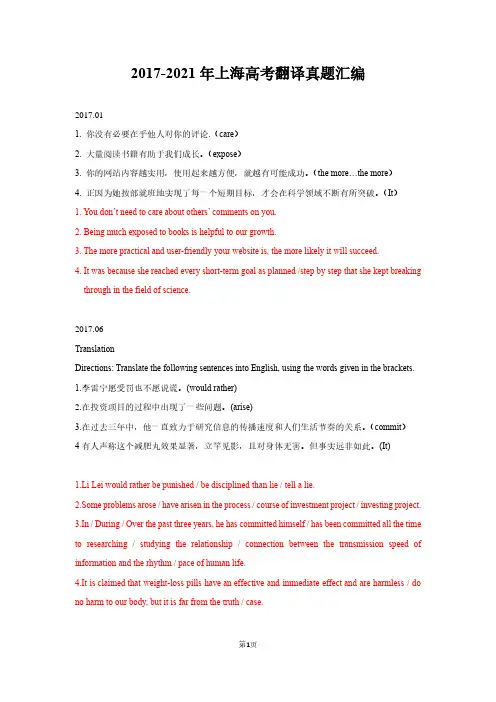
2017-2021年上海高考翻译真题汇编2017.011. 你没有必要在乎他人对你的评论.(care)2. 大量阅读书籍有助于我们成长。
(expose)3. 你的网站内容越实用,使用起来越方便,就越有可能成功。
(the more…the more)4. 正因为她按部就班地实现了每一个短期目标,才会在科学领域不断有所突破。
(It)1. You don’t need to care about others’ comments on you.2. Being much exposed to books is helpful to our growth.3. The more practical and user-friendly your website is, the more likely it will succeed.4. It was because she reached every short-term goal as planned /step by step that she kept breaking through in the field of science.2017.06TranslationDirections: Translate the following sentences into English, using the words given in the brackets.1.李雷宁愿受罚也不愿说谎。
(would rather)2.在投资项目的过程中出现了一些问题。
(arise)3.在过去三年中,他一直致力于研究信息的传播速度和人们生活节奏的关系。
(commit)4有人声称这个减肥丸效果显著,立竿见影,且对身体无害。
但事实远非如此。
(It)1.Li Lei would rather be punished / be disciplined than lie / tell a lie.2.Some problems arose / have arisen in the process / course of investment project / investing project.3.In / During / Over the past three years, he has committed himself / has been committed all the time to researching / studying the relationship / connection between the transmission speed of information and the rhythm / pace of human life.4.It is claimed that weight-loss pills have an effective and immediate effect and are harmless / do no harm to our body, but it is far from the truth / case.2018.011.不要喝太多含糖饮料,否则会发胖。
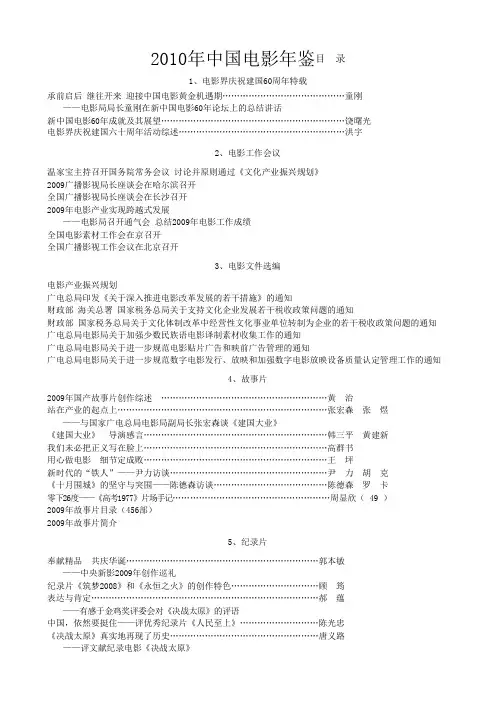
2010年中国电影年鉴目录1、电影界庆祝建国60周年特载承前启后继往开来迎接中国电影黄金机遇期……………………………………童刚——电影局局长童刚在新中国电影60年论坛上的总结讲话新中国电影60年成就及其展望………………………………………………………饶曙光电影界庆祝建国六十周年活动综述…………………………………………………洪宇2、电影工作会议温家宝主持召开国务院常务会议讨论并原则通过《文化产业振兴规划》2009广播影视局长座谈会在哈尔滨召开全国广播影视局长座谈会在长沙召开2009年电影产业实现跨越式发展——电影局召开通气会总结2009年电影工作成绩全国电影素材工作会在京召开全国广播影视工作会议在北京召开3、电影文件选编电影产业振兴规划广电总局印发《关于深入推进电影改革发展的若干措施》的通知财政部海关总署国家税务总局关于支持文化企业发展若干税收政策问题的通知财政部国家税务总局关于文化体制改革中经营性文化事业单位转制为企业的若干税收政策问题的通知广电总局电影局关于加强少数民族语电影译制素材收集工作的通知广电总局电影局关于进一步规范电影贴片广告和映前广告管理的通知广电总局电影局关于进一步规范数字电影发行、放映和加强数字电影放映设备质量认定管理工作的通知4、故事片2009年国产故事片创作综述…………………………………………………黄治站在产业的起点上………………………………………………………………张宏森张煜——与国家广电总局电影局副局长张宏森谈《建国大业》《建国大业》导演感言………………………………………………………韩三平黄建新我们未必把正义写在脸上………………………………………………………高群书用心做电影细节定成败………………………………………………………王坪新时代的“铁人”——尹力访谈………………………………………………尹力胡克《十月围城》的坚守与突围——陈德森访谈…………………………………陈德森罗卡零下26度——《高考1977》片场手记………………………………………………周显欣( 49 )2009年故事片目录(456部)2009年故事片简介5、纪录片奉献精品共庆华诞…………………………………………………………郭本敏——中央新影2009年创作巡礼纪录片《筑梦2008》和《永恒之火》的创作特色…………………………顾筠表达与肯定……………………………………………………………………郝蕴——有感于金鸡奖评委会对《决战太原》的评语中国,依然要挺住——评优秀纪录片《人民至上》………………………陈光忠《决战太原》真实地再现了历史……………………………………………唐义路——评文献纪录电影《决战太原》长街留痕——纪录电影《长安街》的创作构想……………………………蓝冰纪录片大师——吴印咸先生(1900—1994)………………………………贡吉玖纪录片先生——孙明经先生(1911—1992)………………………………董成明6、动画电影中国动画要做大做强——2009年动画产业述评……………………………张松林2009上海美术电影制片厂综述………………………………………………邱艳红中国动画60 年“观念系统”浅议…………………………………………李镇电影营销橇动中国动画产业的第一桶金……………………………………陈英杰——从《喜洋洋》到《麦兜响当当》学院派动画照样可以有所作为………………………………………………孙立军——原创动画路上“快乐奔跑”国产3D 动画电影:摸着石头过河………………………………采访/整理孙宏达7、科教片2009年科教片生产创作概述…………………………………………………亶旦科教片的现状及发展策略……………………………………………………郭峰李焕勤浅谈科教片创作中戏剧因素的捕捉…………………………………………探析数字技术对科学纪录片的影响…………………………………………万彬彬新中国第一个科教电影机构的雏形…………………………………………高广元《月球探秘》放映现场交流实录2009年科教片目录8、电视电影2009年电视电影综述…………………………………………………………赵小青岳扬1999—2009电影频道电视电影创作十年概要2009年第10届电影频道数字电影“百合奖”获奖名单2009年电视电影目录(110部)2009年电视电影简介9、电影市场2009年中国电影市场总览……………………………………………………周宝林2009年我国内地电影业发展评述……………………………………………朱玉卿2009年国产影片海外销售及推广情况分析…………………………朱玉卿周铁东2009年城市院线电影市场概况2009年票房3000万元以上影院排名2009年3D电影上映及巨幕(IMAX)影厅放映情况2009年数字电影发行放映情况概述河南流动数字电影院线发展现状及前景浅析……………………………熊延江辽宁北方电影院线运营纪实………………………………………………李璇10、电影理论2009年中国电影理论研究综述……………………………………………主义、原理与方法…………………………………………………………陈宇——对当下中国电影界创作及理论倾向的思考主流大片:邓小平理论在文化实践中的一个典范………………陈犀禾刘帆电影“中莱坞”:全球影像版图的重构?………………………………孙绍谊对现阶段喜剧电影创作变化的一点思考…………………………………付宇“作家电影”:类型片中稀缺的品种……………………………………韩志军《建国大业》:国家合法性的庄严表达………………………………张颐武非《圣经》的叙事…………………………………………………………徐浩峰——评电影《建国大业》《非诚勿扰》:商业逻辑下的文本移植…………………………………陆邵阳片大无风骨艺术有境界…………………………………………………王昕——《赤壁》的意境美学观照《高考1977》:历史变革中的惶惑与抗争………………………………龚金平伟大“沂蒙精神”的本源和内涵——评电影《战争中的女人——沂蒙六姐妹》…………………………丁凤云11、电影史2009年电影史研究述评……………………………………………………马锐袁牧之的电影修辞艺术……………………………………………………郦苏元“东亚之光”:何非光人生影事初探……………………………………陈墨徐滔:革命文艺与悲壮人生………………………………………………徐文明“人”的寻觅——新中国传记影片发展述略……………………………程敏论新中国的电影改编………………………………………………………周斌失节的影像…………………………………………………………………王洪——东北沦陷时期电影新探走近电影走近历史………………………………………………………郦苏元1930—1933:中国电影明星制度的初步完备……………………………阎凯蕾新中国电影“十七年”的光彩……………………………………………章柏青硝烟中的嬗变………………………………………………………………皇甫宜川——新中国战争片60年新中国电影发行变迁谈……………………………………………………翁立1937年前中国电影制片业的梳理与研究…………………………………刘扬回忆蔡楚生…………………………………………………………………理想的冲突…………………………………………………………………陈山——史学价值观与史学创新新中国电影史上的第一次改革思潮………………………………………启之——五十三年前的思想论争解读兴山……………………………………………………………………鲁明——为纪念袁牧之诞辰100周年而作12、电影音乐2009年度中国电影音乐创作分析报告………………………………王秋兰陈丽丹郝昕范琳琳影片《建国大业》的音乐创作……………………………………………苗禾理想·灵魂——影片《孔子》的音乐……………………………………朱天纬从《马兰花》看中国动画音乐创作的发展………………………………张立全球语境下的中国现代电影音乐多元化特征解析………………………陈斌施万春访谈录………………………………………………………………采访人:苗禾13、电影科技统一思想形成合力迎接数字电影新时代到来………………………毛羽——2009年全国电影科技工作报告数字电影的信息化交易、服务和管理……………………………………鲍林岳在相互借鉴交叉融合中演进的电影电视技术………………………张春晓电影数字放映设备国产化之思考…………………………………………杨步亭——在中国电子视像行业学会举办的大屏幕投影显示技术与产业高层论坛会上的讲话加快文化产业改革中推进广播影视科技产业化…………………………李琦14、电影科研与教学中国电影2009笔谈…………………………………………………………张会军等给学生飞翔的空间和机会…………………………………………………余韬采访——电影学院副院长谢晓晶谈实践教学体系的建设新中国电影的现实叙事与影像重构………………………………………陈晓云电影剧本创作的重要性……………………………………………………向往——兼谈北京电影学院毕业联合作业的剧本创作现状改革开放30年的一份厚礼…………………………………………………鲁明——喜读张会军的《北京电影学院78班回忆录》国庆献礼片60年巡礼(1949~2009)(503)…………………………钟大丰历史的讽刺力………………………………………………………………王志敏赵楠——谢晋遭遇了蝴蝶效应之后15、电影文化交流2009年电影局对外交流工作综述2009年向电影局备案参加国际(含港澳台地区)电影节影片情况亚欧国家电影家协会主席论坛暨世界电影联盟2009年年会在京举行16、电影评奖第十三届电影华表奖获奖名单第二十七届中国电影金鸡奖获奖及提名名单第二十七届中国电影金鸡奖评选侧记年度华表奖、金鸡奖获奖人员简介第十二届上海国际电影节第十六届北京大学生电影节第十二届中国电影表演学会奖颁奖第十届中国儿童电影节在青岛举行17、电影机构各省、直辖市电影行政管理部门名录部分电影经纪公司简介北京华谊兄弟时代文化经纪有限公司………………………………谭英中国电影集团公司艺术创作人员中心………………………………史纪北京博纳演艺经纪有限公司…………………………………………邬雪琴北京橙天智鸿文化经纪有限公司……………………………………胡佳18、报刊文章选目2009年全国电影报刊文章选目19、电影图书全国电影图书目录(2009)全国电影图书目录(2008补遗)20、追思录2009年逝世的部分电影工作者沙莉石方禹项堃李丁钱千里沈默君顾也鲁21、香港电影2009香港电影回顾……………………………………………………列孚“香港电影百年”断想………………………………………………赵卫防《窃听风云》:港片新模式?………………………………………刘辉新影联影业公司:香港粤语文艺片复兴的棋手……………………张燕香港地区电影融资及风险管理状况剪影……………………………魏萍2009年十大最卖座港片第五届香港影视娱乐博览第二十八届香港电影金像奖第十五届香港电影评论学会大奖香港电影故事梗概(4则)简讯22、台湾电影2009年台湾电影回顾……………………………………………………梁良2005~2008台湾电影与新新导演显像…………………………………齐隆壬以影像立言——论台湾女导演黄玉珊…………………………………孙慰川用灰黑色涂抹一片真实的天空…………………………………………王秀——解读《不能没有你》中的写实主义第四十六届台湾电影金马奖台湾电影故事梗概(四则)简讯23、外国电影资料柏林国际电影节(2009年,第59届)戛纳国际电影节(2009年,第62届)威尼斯国际电影节(2009年,第66届)东京国际电影节(2009年,第22届)莫斯科国际电影节(2009年,第31届)釜山国际电影节获奖名单(2009年,第14届)美国电影艺术与科学学院奥斯卡金像奖(第82届)好莱坞外国记者协会金球奖(第67届)全美电影评论委员会奖(第44届)纽约电影评论奖(2009年,第75届)英国电影与电视艺术学院奖(第63届)恺撒奖(2009年,第34届)日本《电影旬报》评选十部“最佳日本影片”(2009年,第83届)《电影旬报》电影奖(2009年,第55届)韩国电影大钟奖(2009年,第46届)24、电影纪事2009年中国电影纪事……………………………………………………一木。
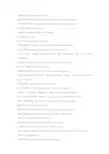
上海证券报Shanghai Securities News上海京鼎动漫科技有限公司Shanghai Jingding Comic Corporation Limited上海知识产权局The Shanghai Municipal Intellectual Property Rights Bureau新闻晚报Shanghai Evening Post上海科技报Shanghai Science And Technology天天新报News Times国家统计局National Bureau of Statistics上海市政府新闻办Shanghai Municipal Government Information Office上海市金融办Shanghai Municipal Office of Financial Services上海市文广局Shanghai Municipal Culture, Radio Broadcasting, Film and Television Administration上海市新闻出版局Shanghai Municipal Press and Publication Bureau中央人民广播电台China National Radio中国浦东干部学院China Executive Leadership Academy Pudong上海市市长国际企业家咨询会议(International Business Leaders' Advisory Council for the Mayor of Shanghai)上海市卫生局Shanghai Municipal Health Bureau复旦大学附属儿科医院Fudan University’s Children’s Hospital上海市第一妇幼保健院Shanghai No.1 Maternity and Child Health Hospital复旦大学附属妇产科医院Obstetrics & Gynecology Hospital of Fudan University市第一妇婴保健医院Shanghai No.1 Maternity and Child Health Hospital香港大公报Hong Kong Ta Kong Pao上海进出口商会Shanghai Chamber of Commerce for Import and Export上海经济团体联合会Shanghai Federation of Economic Organizations上海老年报Shanghai Senior Citizen Post上海市民政局Shanghai Municipal Bureau of Civil Affairs上实集团Shanghai Industrial Investment (Holding) Co. Ltd上海出入境边防检查总站Shanghai General Station of Exit and Entry Frontier Inspection上海海关Shanghai Customs上海海事局Shanghai Maritime Safety Administration上海出入境检验检疫局Shanghai Entry-Exit Inspection and Quarantine Bureau上海市口岸服务办公室Shanghai Municipal Office for Port Services上海市交通运输和港口管理局Shanghai Municipal Transport and Port AuthorityUnited Nations World Food Programme 联合国粮农署上海文化出版社Shanghai Culture Publishing House盛大文学网Cloudary Corporation上海理工大学University of Shanghai for Science & Technology上海法制报Shanghai Law Journal上海三联书店Shanghai Sanlian Bookstore上海译文出版社Shanghai Translation Publishing House上海外语教育出版社Shanghai Foreign Language Education Press中国图书进出口总公司China National Publications Import and Export Corporation上海外文图书公司Shanghai Book Traders上海市质量技术监督局Shanghai Municipal Bureau of Quality and Technical Supervision中国标准出版社Standards Press of China劳动报Laodong Daily上海市文物管理委员会Shanghai Municipal Administration Commission of Cultural Heritage 公共租界Shanghai International Settlement四行仓库Sihang Warehouse宋园茶艺馆Songyuan Teahouse中华白海豚Indo-Pacific Humpback Dolphin光明日报出版社Guangming Daily Press上海人民出版社Shanghai People's Publishing House中国大百科全书出版社Encyclopedia of China Publishing House中科院Chinese Academy of Sciences上海光源Shanghai Synchrotron Radiation Facility辰山植物园Chenshan Botanical Garden中国肝癌科学中心China Liver Cancer Science Center上海国际主题公园公司(迪斯尼项目)The Shanghai International Theme Park Co, Ltd, which is in charge of the theme park上海申迪Shanghai Shendi Group中国经营报China Business Journal上海市工商联Shanghai Federation of Industry and Commerce上海市人力资源和社会保障局Shanghai Municipal Human Resources and Social Security Bureau上海人民广播电台Shanghai People’s Radio Station上海财经大学Shanghai University of Finance and Economics上海兴国宾馆Radisson Plaza Xing Guo Hotel Shanghai上海金融业联合会Shanghai Financial Association国家知识产权局State Intellectual Property Office上海教育电视台Shanghai Education Television Station上海市经济和信息化委员会Shanghai Municipal Economic and Infomatization Commission大唐电信Datang Telecom21世纪经济报道21st Century Business Herald上海春秋国旅Shanghai Spring International Travel Services新民网湖南文艺出版社Hunan Literature and Art Publishing House东方出版社People's Publishing House (The Oriental Press)金城出版社Gold Wall Press第一财经日报First Financial Daily上海市农委Shanghai Municipal Agricultural Commission上海国际工业设计中心Shanghai International Industrial Design Center上海市城乡建设和交通委员会Shanghai Municipal Urban and Rural Construction and Transportation Commission东海救助局Donghai Rescue Bureau of the Ministry of Transport中国海上搜救中心Chinese Marine Search and Rescue Center国际海事组织International Maritime Organization民航上海安全监督管理局Shanghai Bureau of Safety Supervision of Civil Aviation Administration of China上海市住房保障和房屋管理局Shanghai Housing--ensuring and Real Estate ManagementAdministration Bureau上海市商务委员会Shanghai Municipal Commission of CommerceGlobal Blue 国际蓝联(消费指导公司)上海国际会议中心Shanghai International Convention Center中国国际工业博览会China International Industry Fair浦江创新论坛Pujiang Innovation Forum上海市科学技术委员会Science and Technology Commission of Shanghai Municipality科学松鼠会Science Squirrels Club上海国际技术贸易促进中心Shanghai International Technology Exchange Center上海绿化和市容局Shanghai Greenery and Public Sanitation Bureau上海市食品药品监督管理局Shanghai Municipal Food and Drug Administration上海新国际博览中心Shanghai New International Expo Center中国对外贸易中心集团China Foreign Trade Center (Group)上海东浩国际服务贸易(集团)有限公司Shanghai EastBest International (Group) Co《中国经营报》(China Business)上海市国际技术进出口促进中心Shanghai International Technology Exchange Center上海新国际博览中心Shanghai New International Expo Center世博发展集团Expo Shanghai Group上海海洋大学Shanghai Ocean University现代出版社Modern Press新星出版社New Star Press辽宁科学技术出版社Liaoning Science and Technology Press安徽人民出版社Anhui People's Publishing House上海人才服务中心Shanghai Human Resources Service Center东海救助局Donghai Rescue Bureau of the Ministry of Transport东海区渔政局Regional Bureau of East China Sea Fishery Management东海海洋预报中心the East China Sea Forecast Center上海市联动中心Shanghai Municipal Emergency Response Center上海市政府法制办Legislative Affairs Office of the Shanghai Municipal People’s Government 《现代快报》(Modern Express)上海市人口和计划生育委员会Shanghai Municipal Population and Family Planning Commission上海市林业局Municipal Forestry Bureau经济日报Economic Daily十八大18th National Congress of the Communist Party of China《自然·遗传学》Nature Genetics上海市安全生产监督管理局Shanghai Municipal Safe Production Supervision Administration 上海安全生产杂志Shanghai Occupation Safety上海中国画院Shanghai Chinese Painting Academy陆俨少艺术院Luyanshao Art Gallery崇明东滩国家鸟类自然保护区Chongming Dongtan Birds National Nature Reserve上海市科委Shanghai Municipal Science and Technology Commission中海地产China Overseas Property本文档由本人收集整理,来源是各个单位的官方网站,为从事翻译人士节约了时间。
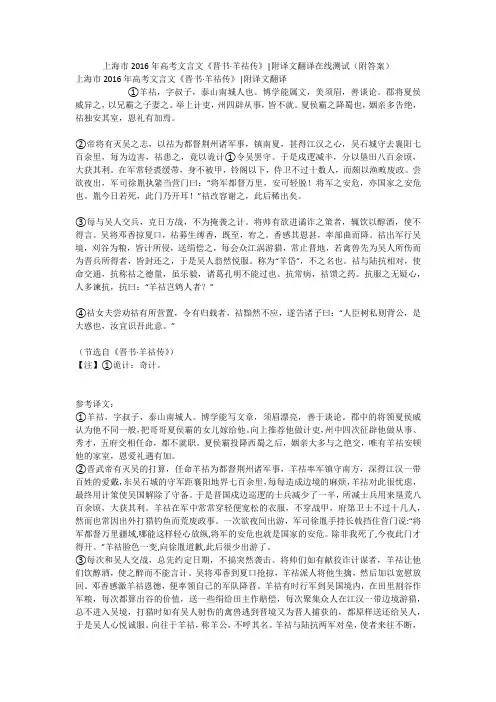
上海市2016年高考文言文《晋书·羊祜传》|附译文翻译在线测试(附答案)上海市2016年高考文言文《晋书·羊祜传》|附译文翻译①羊祜,字叔子,泰山南城人也。
博学能属文,美须眉,善谈论。
郡将夏侯威异之,以兄霸之子妻之。
举上计吏,州四辟从事,皆不就。
夏侯霸之降蜀也,姻亲多告绝,祜独安其室,恩礼有加焉。
②帝将有灭吴之志,以祜为都督荆州诸军事,镇南夏,甚得江汉之心,吴石城守去襄阳七百余里,每为边害,祜患之,竟以诡计①令吴罢守。
于是戍逻减半,分以垦田八百余顷,大获其利。
在军常轻裘缓带,身不被甲,铃阁以下,侍卫不过十数人,而颇以渔畋废政。
尝欲夜出,军司徐胤执綮当营门曰:“将军都督万里,安可轻脱!将军之安危,亦国家之安危也。
胤今日若死,此门乃开耳!”祜改容谢之,此后稀出矣。
③每与吴人交兵,克日方战,不为掩袭之计。
将帅有欲进谲诈之策者,辄饮以醇酒,使不得言。
吴将邓香掠夏口,祜募生缚香,既至,宥之。
香感其恩甚,率部曲而降。
祜出军行吴境,刈谷为粮,皆计所侵,送绢偿之,每会众江涡游猎,常止晋地,若禽兽先为吴人所伤而为晋兵所得者,皆封还之,于是吴人翁然悦服。
称为“羊岱”,不之名也。
祜与陆抗相对,使命交通,抗称祜之德量,虽乐毅,诸葛孔明不能过也。
抗常病,祜馈之药。
抗服之无疑心,人多谏抗,抗曰:“羊祜岂鸩人者?”④祜女夫尝劝祜有所营置,令有归载者,祜黯然不应,遂告诸子曰:“人臣树私则背公,是大惑也,汝宜识吾此意。
”(节选自《晋书·羊祜传》)【注】①诡计:奇计。
参考译文:①羊祜,字叔子,泰山南城人。
博学能写文章,须眉漂亮,善于谈论。
郡中的将领夏侯威认为他不同一般,把哥哥夏侯霸的女儿嫁给他。
向上推荐他做计吏,州中四次征辟他做从事、秀才,五府交相任命,都不就职。
夏侯霸投降西蜀之后,姻亲大多与之绝交,唯有羊祜安顿他的家室,恩爱礼遇有加。
②晋武帝有灭吴的打算,任命羊祜为都督荆州诸军事,羊祜率军镇守南方,深得江汉一带百姓的爱戴,东吴石城的守军距襄阳地界七百余里,每每造成边境的麻烦,羊祜对此很忧虑,最终用计策使吴国解除了守备。
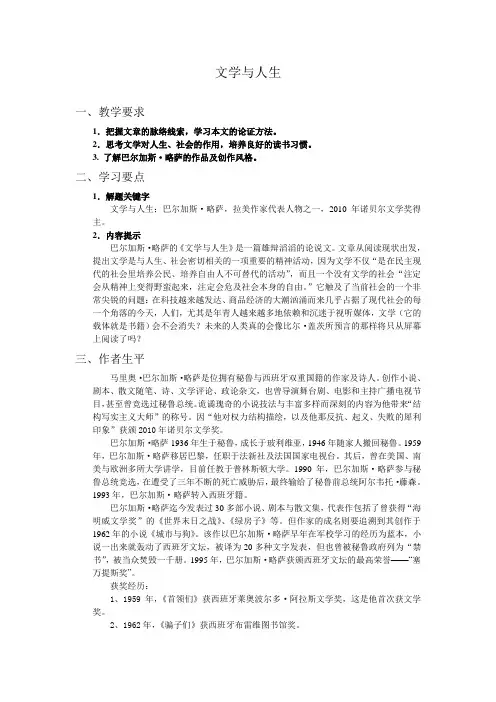
文学与人生一、教学要求1.把握文章的脉络线索,学习本文的论证方法。
2.思考文学对人生、社会的作用,培养良好的读书习惯。
3. 了解巴尔加斯·略萨的作品及创作风格。
二、学习要点1.解题关键字文学与人生;巴尔加斯·略萨,拉美作家代表人物之一,2010年诺贝尔文学奖得主。
2.内容提示巴尔加斯·略萨的《文学与人生》是一篇雄辩滔滔的论说文。
文章从阅读现状出发,提出文学是与人生、社会密切相关的一项重要的精神活动,因为文学不仅“是在民主现代的社会里培养公民、培养自由人不可替代的活动”,而且一个没有文学的社会“注定会从精神上变得野蛮起来,注定会危及社会本身的自由。
”它触及了当前社会的一个非常尖锐的问题:在科技越来越发达、商品经济的大潮汹涌而来几乎占据了现代社会的每一个角落的今天,人们,尤其是年青人越来越多地依赖和沉迷于视听媒体,文学(它的载体就是书籍)会不会消失?未来的人类真的会像比尔·盖茨所预言的那样将只从屏幕上阅读了吗?三、作者生平马里奥·巴尔加斯·略萨是位拥有秘鲁与西班牙双重国籍的作家及诗人。
创作小说、剧本、散文随笔、诗、文学评论、政论杂文,也曾导演舞台剧、电影和主持广播电视节目,甚至曾竞选过秘鲁总统。
诡谲瑰奇的小说技法与丰富多样而深刻的内容为他带来“结构写实主义大师”的称号。
因“他对权力结构描绘,以及他那反抗、起义、失败的犀利印象”获颁2010年诺贝尔文学奖。
巴尔加斯·略萨1936年生于秘鲁,成长于玻利维亚,1946年随家人搬回秘鲁。
1959年,巴尔加斯·略萨移居巴黎,任职于法新社及法国国家电视台。
其后,曾在美国、南美与欧洲多所大学讲学,目前任教于普林斯顿大学。
1990年,巴尔加斯·略萨参与秘鲁总统竞选,在遭受了三年不断的死亡威胁后,最终输给了秘鲁前总统阿尔韦托·藤森。
1993年,巴尔加斯·略萨转入西班牙籍。
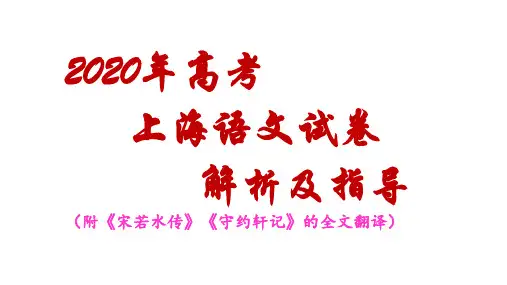
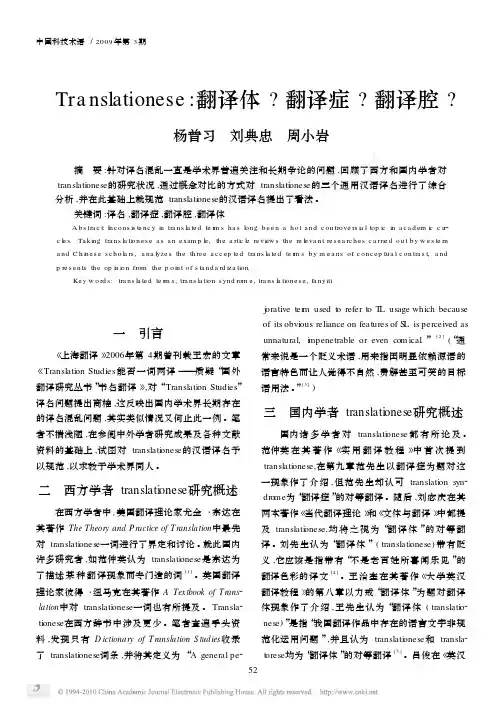
中国科技术语/2009年第3期Tra nslationese:翻译体?翻译症?翻译腔?杨普习 刘典忠 周小岩摘 要:针对译名混乱一直是学术界普遍关注和长期争论的问题,回顾了西方和国内学者对translati onese的研究状况,通过概念对比的方式对translati onese的三个通用汉语译名进行了综合分析,并在此基础上就规范translati onese的汉语译名提出了看法。
关键词:译名,翻译症,翻译腔,翻译体A b s tra c t:Inc ons i s te nc y in tra ns la te d te r m s ha s l ong b e e n a ho t a nd c on trove rs i a l top ic in a c a d em ic c ir2c le s.Ta king tra ns l a ti one s e a s a n e xam p le,the a rtic le re vi ew s the re le va n t re s e a rc he s c a rried ou t b y we s te rna nd C h i ne s e s c ho l a rs,a na l yze s the th re e a c c ep te d tra ns la te d te r m sb y m e a ns ofc onc ep tua l c on tra s t,a ndp re s e n ts the op i n i on from the p o in t of s ta nd a rd iza tion.Ke y w o rd s:tra ns la te d te r m s,tra ns la tion s ynd rom e,tra ns l a tione s e,fa nyiti一 引言《上海翻译》2006年第4期曾刊载王宏的文章《Translati on Studies能否一词两译———质疑“国外翻译研究丛书”书名翻译》,对“Translati on Studies”译名问题提出商榷,这反映出国内学术界长期存在的译名混乱问题,其实类似情况又何止此一例。
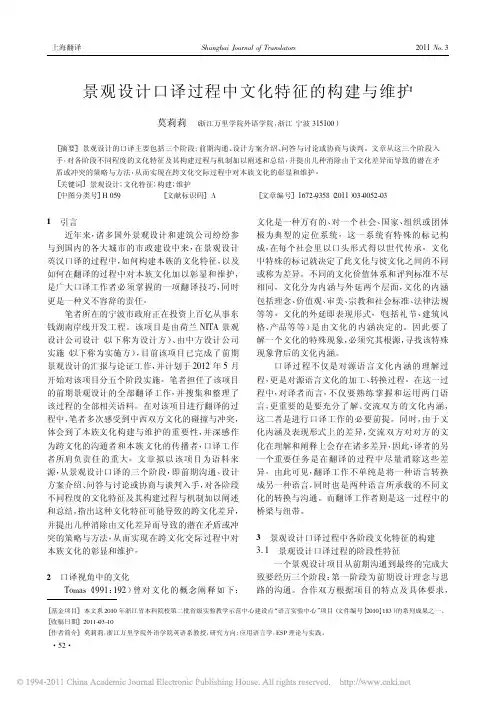
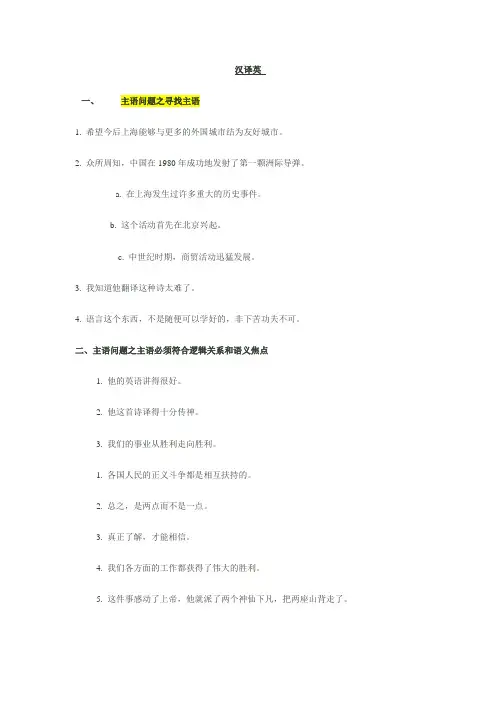
汉译英一、主语问题之寻找主语1. 希望今后上海能够与更多的外国城市结为友好城市。
2. 众所周知,中国在1980年成功地发射了第一颗洲际导弹。
a. 在上海发生过许多重大的历史事件。
b. 这个活动首先在北京兴起。
c. 中世纪时期,商贸活动迅猛发展。
3. 我知道他翻译这种诗太难了。
4. 语言这个东西,不是随便可以学好的,非下苦功夫不可。
二、主语问题之主语必须符合逻辑关系和语义焦点1. 他的英语讲得很好。
2. 他这首诗译得十分传神。
3. 我们的事业从胜利走向胜利。
1. 各国人民的正义斗争都是相互扶持的。
2. 总之,是两点而不是一点。
3. 真正了解,才能相信。
4. 我们各方面的工作都获得了伟大的胜利。
5. 这件事感动了上帝,他就派了两个神仙下凡,把两座山背走了。
英译汉之增译法一、增加连接词1. A bit of knowledge kept me from making a big mistake when an important question was to be decided.2. The strongest man cannot alter the law of nature.二、补充省略成分1. Matter can be changed into energy,and energy into matter.2. This victory in polemics means the victory of civilization over ignorance, of science over superstition and of truth over falsehood.三、增加时间状语1. We can learn what we did not know.2. The historic sites, which had the important politic, economic and religious things going on, are almost all gone.四、增加解释性说明1. In April, there was the “ping” heard around the world. In July, the ping “ponged”.2.钱先生周岁时“抓周”,抓了一本书,因而得名“钟书”。
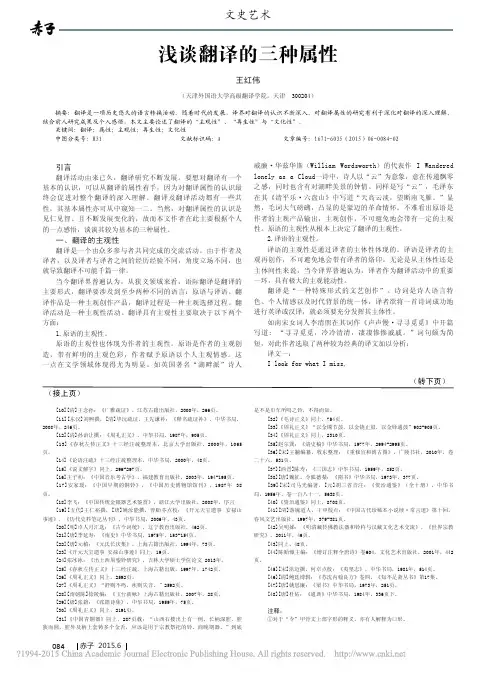
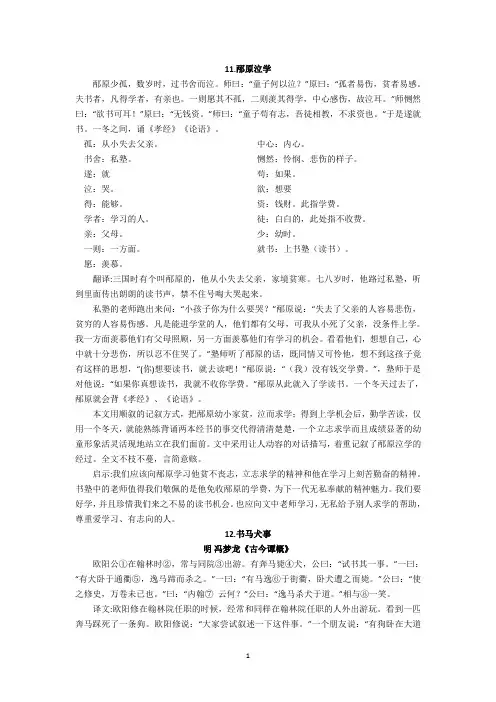
11.邴原泣学邴原少孤,数岁时,过书舍而泣。
师曰:“童子何以泣?”原曰:“孤者易伤,贫者易感。
夫书者,凡得学者,有亲也。
一则愿其不孤,二则羡其得学,中心感伤,故泣耳。
”师恻然曰:“欲书可耳!”原曰:“无钱资。
”师曰:“童子苟有志,吾徒相教,不求资也。
”于是遂就书。
一冬之间,诵《孝经》《论语》。
孤:从小失去父亲。
书舍:私塾。
遂:就泣:哭。
得:能够。
学者:学习的人。
亲:父母。
一则:一方面。
愿:羡慕。
中心:内心。
恻然:怜悯、悲伤的样子。
苟:如果。
欲:想要资:钱财。
此指学费。
徒:白白的,此处指不收费。
少:幼时。
就书:上书塾(读书)。
翻译:三国时有个叫邴原的,他从小失去父亲,家境贫寒。
七八岁时,他路过私塾,听到里面传出朗朗的读书声,禁不住号啕大哭起来。
私塾的老师跑出来问:“小孩子你为什么要哭?”邴原说:“失去了父亲的人容易悲伤,贫穷的人容易伤感。
凡是能进学堂的人,他们都有父母,可我从小死了父亲,没条件上学。
我一方面羡慕他们有父母照顾,另一方面羡慕他们有学习的机会。
看看他们,想想自己,心中就十分悲伤,所以忍不住哭了。
”塾师听了邴原的话,既同情又可怜他,想不到这孩子竟有这样的思想,“(你)想要读书,就去读吧!”邴原说:“(我)没有钱交学费。
”,塾师于是对他说:“如果你真想读书,我就不收你学费。
”邴原从此就入了学读书。
一个冬天过去了,邴原就会背《孝经》、《论语》。
本文用顺叙的记叙方式,把邴原幼小家贫,泣而求学;得到上学机会后,勤学苦读,仅用一个冬天,就能熟练背诵两本经书的事交代得清清楚楚,一个立志求学而且成绩显著的幼童形象活灵活现地站立在我们面前。
文中采用让人动容的对话描写,着重记叙了邴原泣学的经过。
全文不枝不蔓,言简意赅。
启示:我们应该向邴原学习他贫不丧志,立志求学的精神和他在学习上刻苦勤奋的精神。
书塾中的老师值得我们敬佩的是他免收邴原的学费,为下一代无私奉献的精神魅力。
我们要好学,并且珍惜我们来之不易的读书机会。
2022年上海高考文言文《庄达甫<摄山采药图>序》字词梳理与译文庄达甫《摄山采药图》序①始余见达甫图其貌,取杜甫诗题之日《看创引杯》。
时达甫方(正)壮年,锐意天下事,议论慷慨,豪气见(展现)于眉目间。
迄(到)今十八九年,屡(一直)因场屋(科举考试的地方,又名科场),益(渐渐)衰且病。
以孝廉方正(孝顺亲长,正直贤良)举,有司(指官吏,古代设官分职,各有专司,故称。
)欲以应召(受人的召唤或召见)用,固(坚决)辞不赴,遂不复应进士举(考中)。
而更为图,曰《摄山采药》。
或以告余日:“达甫殆(大概)无意于世也夫?”余闻而疑之。
古之君子,汲汲(急切地追求)忧乐于天下者,诚(确实)以道存也。
道苟(如果)存,不以遇不遇异其志,又不当以吾身之衰而有自安之心。
达甫年未五十,道之行不行未可知,纵不得于今,亦当有以(能够)见于后,而区区(数量少:不重要)摄生之谋哉?与向所用于达甫者颇大异。
②然余窃(暗中:偷偷地)尝论国家之用人口,如臾树、扃鹊之蓄(储存)百药焉,取之必择其地,聚之必当(造当的)其时,储之必备其物。
一旦有用,出之笼中而不匮為者,其求预也。
事方其急而号(命令)之山泽(山野)之间其捆载(捆载而归,形容带回的东西很多)而未者,必柴胡、桔梗也,人参、紫芝、丹砂、石乳,未有能致(获得)者焉,人参、紫芝、丹砂、石乳之用,而投以柴胡、桔梗,其不足以愈病而逸之死也明甚。
见柴胡、桔梗之不足以愈病,而以为天下之药皆若是,其惑岂细耶?③若是者曾不足以当庸医,而俨然(形容特别像)任国家,进退天下士,自以为得之。
世有臾拊、局鹊,宁不为大忧耶?余又疑以为达甫之意或出于此。
然吾闻古之有道之士,盖有重治其精神而易天下者,吾未尝学之也,达甫傥闻之欤(语气助词) ?序其事,姑(姑且)以问之(以之问)。
[注]①看创引杯:出自社甫诗句“检书烧烛短,看创引杯长”。
②摄生:养生。
③易:轻视。
④傥:或(五)阅读下文,完成第21—24题。
(11分)庄达甫《摄山采药图》序(清)张惠言①始余见达甫图其貌,取杜甫诗题之曰《看剑引杯》①。
2018 年上外高翻 MTI 研究生统考《汉语百科知识》考题完整版百科知识(一)选择题1.能表演“掌上舞”是古代哪位美女?(几个选项是:貂蝉,西施,赵飞燕,杨玉环)2.《史记》中“世家”是给什么人做的传?(帝王,王侯,将士,还有一个忘了。
)3.“孔雀东南飞”和___并称诗歌史上的“双壁:4.“菊月”是指哪一个月?5.“红肥绿瘦”是指什么季节?6.“司空见惯”中“司空”是指? A唐朝的一位诗人 B唐朝的一位高僧 C一个官职7.下面哪一个是武松所为?A倒拔垂杨柳 B汴京城卖刀 C醉打蒋门神8.“名花解语”是指什么?9.“程门立雪”是为了什么?A拜访 B请罪 C道谢 D拜别10.一知半解又爱炫耀的人我们通常用什么词语形容?A半截剑 B半段枪 C半面 D半瓶醋11.“七月流火”形容的是? A炎炎夏日 B夏去秋来 C春去秋来 D秋去冬来12.“汗流浃背”是为了什么?13.京剧中,性格活泼的青年女性是? A青衣 B花旦 C彩旦14. “杨柳”是? A一种植物 B两种植物 C与植物无关15“成也萧何败萧何”指的是哪位历史人物?(二)成语解释精卫填海来龙去脉初出茅庐韬光养晦斯芬克之谜2018英语专业考研备考精华资料史上最全最有效大家论坛原创基础英语英汉互译二外语言学英美文学英美文化学校真题汇总等热门必备的辅导书:基础与综合英语[基础英语] 2018英语专业考研考点精梳与精练基础英语[大家网]英语专业考研名校全真试卷基础英语 07到 10年真卷与解读下载[大家网]2018英语专业基础英语考研真题详解.圣才.2018年版[大家网]2018英语专业基础英语考研真题详解.金圣才. 2009出版[大家网]09年版.英语专业考研基础英语高分突破.吴中东.宫玉波[大家网]10年题解英语专业考研过关必备 3000词 PDF.金圣才版1[大家网]英语专业考研核心词汇.pdf.宫玉波.09版[大家网]题解英语专业考研过关必备 3000词[大家网]读者的选择阅读手册[大家网]读者的选择第 4版英文版[大家网]谈语言写作读本英汉互译:[大家网]2018英语专业英汉互译考研真题与典型题详解.圣才考研网编[大家网]星火英语专业考研名校全真试卷精解英汉互译(2018)[大家网]2018年英语专业考研名校全真题精解.英汉互译.郭棲庆.10年版重点推荐资料:点击下载!英语专业考研(最全最新!) /thread-2407892-1-1.html 基础英语汇总:各校基础英语真题资料汇总英美文学:各校英美文学真题汇总二外:英研二外资料——日语、法语、德语、俄语、西班牙语等汇总学校真题汇总:中国人民大学英语专业考研真题汇总!中国矿业大学英语专业考研资料汇总!上海外国语大学北京外语国大学资料汇总华中师范大学英语专业考研--汇总华中科技大学英语专业考研资料汇总广东外语外贸大学深圳大学的真题汇总南开大学英语专业考研真题汇总中山大学资料汇总暨南大学资料北京航空航天大学英语专业考研真题资料西安外国语大学英语专业考研真题汇总河海大学英语专业考研真题资料汇总中国海洋大学英语专业考研资料小汇武汉理工大学英语专业考研资料汇总武汉大学英语专业考研资料汇总苏州大学英语专业考研资料北京师范大学英语专业考研资料汇总西安外国语大学英语专业考研真题汇总四川大学英语专业考研真题资料汇总!2南京大学英语专业考研资料中南大学二外法语 01年到 07年真题 pdf翻译资料:全日制翻译硕士专业学位 MTI研究生入学考试指南外事翻译口译和笔译技巧.rar下载[大家网]新编当代翻译理论刘宓庆著下载[大家网]英汉翻译综合教程[大家网]西方译学理论辑要下载[大家网]英语翻译理论与实践论文集下载[大家网]外事翻译口译和笔译技巧.rar下载汉语成语典故谚语与歇后语英语翻译全国 68所院校英汉互译试卷分析英语专业考研翻译超全面的笔记~英语专业考研各大院校题型对比分析 pdf英语修辞手法经济学人文本许渊冲与翻译艺术.张智中.扫描版散文佳作 108篇汉英英汉对照报刊英语单词精华经济指标名词解释真题:基础英语汇总:各校基础英语真题资料汇总英美文学:各校英美文学真题汇总二外:英研二外资料——日语法语德语俄语西班牙语等汇总语言学方面真题:汇总中中南大学 2006年英语语言文学与文化综合知识真题四川外语学院 01-06年英语语言文学真题长安大学 2007年英语语言学真题四川外国语大学英语专业 2006年考研真题翻译真题:汇总中广外英语专业历年初试真题水平+翻译与写作武汉大学 2009综合英语汉译英真题及参考答案南京大学 2007基础英语汉译英及参考答案文本及 pdf广外 10年写作与翻译真题3上外 01-08年英汉互译真题外交学院翻译真题及答案杭州师范大学 2018年硕士生招生入学考试科目和参考书目9.天津地区院校英专考研翻译真题8.上海地区院校英专考研翻译真题7.陕西地区院校英专考研翻译真题6.江苏地区院校英专考研翻译真题5.湖北地区院校英专考研翻译真题4.广东地区院校英专考研翻译真题3.福建地区院校英专考研翻译真题[大家网]2.东北地区院校英专考研翻译真题.pdf[大家网]1.北京地区院校英专考研翻译真题.pdf[大家网]高级英语第一册第二册教材及教师用书 rar下载孙亦丽--大学英语精读学习精要--第一册第二册第三册 pdf下载【大家论坛】传播学原理 2009年版张国良全日制翻译硕士专业学位 MTI研究生入学考试指南英语专业考研名校全真试卷基础英语 07到年真卷与解读下载英语专业考研核心词汇.pdf.宫玉波.09版孙亦丽--大学英语精读学习精要--第一册第二册第三册 pdf下载高级英语第二册教材及教师用书第一册 rar下载MTI之 2018中文百科-keys(杭州小蚩尤尝鲜版)1.汉宫飞燕赵飞燕身材轻盈,有人认为是古代芭蕾的雏形。
论波德莱尔《腐尸》的风格与翻译胡曼莉【摘要】波德莱尔的<腐尸>以其独特的格律、新颖的内容、深刻的哲理、恶中发掘美的美学意识及其包含的现代性引起了我国学者的关注.然而由于翻译条件和翻译观念的不同而呈现出水平参差不齐的翻译作品,本文从众多译本中选出5个为例,解决哪一个译本更有价值的问题,并在此基础上进一步探寻翻译波德莱尔诗歌的要点.【期刊名称】《法国研究》【年(卷),期】2010(000)004【总页数】6页(P49-54)【关键词】《腐尸》;风格;翻译;比较;要点【作者】胡曼莉【作者单位】西安外国语大学【正文语种】中文戴望舒曾就翻译波德莱尔诗歌说过:“波德莱尔所给与我们的苦难,又比其他外国诗人更难以克服。
”① 戴望舒:《戴望舒译诗集》,长沙:湖南人民出版社,1983,第153页。
主要是因为波诗的延展性给翻译带来了巨大的困难,尤其是《腐尸》最具波诗的特点,它的翻译也就提升了难度。
1924年徐志摩首先将《Une Charogne》译成中文,题为《死尸》,“同时,金满成也在《文学旬刊》第57期(1924年12月)上发表了他翻译的《死尸》。
……《文学旬刊》又在59期上发表了由张人权重译的同一首诗,题为《腐尸》。
”② 刘波、尹丽:《波德莱尔作品汉译回顾》,载《四川外语学院学报》。
2008,第2期。
学衡派代表之一李思纯也用古体诗翻译了这首诗,题名《腐烂之女尸》。
三、四十年代到改革开放前,特殊的中国国情使得翻译现实主义、批判现实主义文学成为主流,而波德莱尔受到了前所未有冷遇,更何况《腐尸》这首诗了,但是王力、钱春绮等学者仍坚持翻译工作,他们的译著在 80年代才得以出版。
新时期波德莱尔译诗版本繁多,较好的有郭宏安、郑克鲁、胡小跃等人的译本。
刘波和尹丽撰写的《波德莱尔作品汉译回顾》为我们提供了很好很充分的资料依据;大量评价《腐尸》恶中之美的文学理论文章也为我们提供了充足的理论依据,然而要想真正了解《腐尸》的内涵,对于不懂法语的人来说译诗是惟一的也是最好的选择,但是由于译者对原文的理解深浅和翻译观的不同而使译文产生了很大的差别,在众多的译本中哪一个最好,哪一个最符合原诗成为急需解决的问题。
MLA 体例里中文文献中文文献的的英文英文格式格式格式(2010修订版)说明1:MLA 体例里中文文献的英文格式,其参考书目(Works Cited )的整体原则是全部遵循MLA 体例,使用英文或拼音,在某些关键的内容后,插入相对应的中文,插入的中文均放在英文的括号英文的括号英文的括号内。
该项目如有对应的标点,应放在括号后。
一般应提供相应中文的包括:作者(译者)姓名、文献名称、书籍报刊杂志的名称,以及其他仅凭英文译文无确认其相应中文的内容。
文内注(In-text Citation )则仍然使用相应的英文或拼音。
本说明依从2009年MLA 第7版规定。
说明2:点击下面表格中的标题,可到达文内相应内容。
点击文内蓝色标题,可返回此目录。
1. 杂志文章2. 报纸文章3. 学术期刊文章4. 书籍5. 新闻(有作者)6. 新闻(无作者)7. 政府网站内容8. 网站文献9. 博客文章1. 杂志文章英文里的基本格式为:例如:来自“中国期刊网”,2009秦姗Complete date, name of edition (if given), section number or title: page(s). 例如:ew York18 Oct. 2009. <http://www.nytimes.是把文章题目和报纸名称翻译成英文,然后在后面MLA。
起“调查”、80亿“救济”:中国外贸压力空前》,刊载于《国际金年王攀起“调查”80亿“救济”: 中国外贸). International Finance ews (国际金融报国外期刊一般明确标明其卷号(V olume No.)、期号(Issue No.),如下例中的“即使不标明Issue No.,总也要标明V olume No.的,如下例中的“20”。
Schools: A Case Study." Educational Review 51.3Jingoism.” Journalism Quarterly20(1943): 205–19. JSTOR但中文里有的则没有标明,只有某年的第几期字样。
上海外国语大学翻译硕士导师简介:陆永昌各位考研的同学们,大家好!我是才思的一名学员,现在已经顺利的考上研究生,今天和大家分享一下这个专业的真题,方便大家准备考研,希望给大家一定的帮助。
陆永昌,1950年出生,江苏扬州人。
上海外国语大学俄语系教授,翻译专业研究生导师。
上海市作家协会会员,上海市翻译家协会会员。
学历教育/进修与访学:1965年进入泰州师范(后更名为泰州师范专科学校)师范毕业后,弃笔从戎,军旅生活使一个普通战斗员变成一个基层指挥员,之后进入上海外国语学院(后更名为上海外国语大学)学习,毕业后留校任教至今。
工作简历:1972年至今上海外国语大学俄语系教师;1982年至1986年曾在上海市政府教育卫生办公室工作;1991年至1993年受国家教委委派往俄罗斯莫斯科国立语言大学翻译系任教;回国后继续在上海外国语大学执教,历任上海外国语学院高年级教研室主任、理论教研室主任、系办公室主任。
1994年被聘为副教授,2000年被聘为教授。
现任俄语系翻译教研室主任。
课程教学:先后从事本科生的文学理论、比较文学、苏俄文学史、名著选读、翻译理论与实践、研究生的中国翻译理论、苏俄翻译理论、俄汉文学翻译理论等课程教学。
研究方向:翻译理论与实践俄罗斯文学主要科研成果:学术专著:《俄汉文学翻译概论》上海外语教育出版社(2007);《快乐家庭教育》广东教育出版社(2004);译著:《雪地寻踪》安徽人民出版社(2012);《森林报秋》安徽人民出版社(2010,与研究生陶爱苏译);《森林报冬》安徽人民出版社(2010,与研究生朱玥晗、杨晨译); 《森林报春》安徽人民出版社(2010,与研究生沈尧译);《森林报夏》安徽人民出版社(2010,与研究生张琪、朱巧玲译) 《白夜》中国致公出版社(2005);《白夜》中国戏剧出版社(2003);《赌徒白夜》延边人民出版社(2001);《赌徒白夜》北岳文艺出版社(2000);《赌徒》北岳文艺出版社(1999);《白夜》北岳文艺出版社(1999);《帕纳耶娃回忆录》上海东方出版中心(1998);《鲸群离去》漓江出版社(1997);《天质女人阶梯》中国城市出版社(1997,与达曼华译) 《狗的日记》上海译文出版社(1993);《愿您的孩子幸福》广东教育出版社(1991);《列宁的一生》广西教育出版社(1991);《女性必读》江苏人民出版社(1989,与达曼华译);《创世纪的案件》沈阳出版社(1988);《阿勃拉莫夫中篇小说选》上海译文出版社(1981,合译);编写的工具书:《苏联文学词典》江苏人民出版社(1984,与廖鸿钧等三人合编);《当代阿拉伯文学词典》译林出版社(1991,与朱威烈等四人合编);《青年文学手册》上海辞书出版社(1990,作为主要编写人参加编写);《中西比较文学手册》四川人民出版社(1987,作为主要编写人参加编写);代表性论文:1.翻译学研究与世界民族文化的融合——作为一门学科迫切需要解决的问题,上海外语教育出版社(2011,载世界俄语教师联合会第12次世界大会论文集:《时间与空间中的俄语和俄罗斯文学》第五卷);2.坚持翻译科学认识论,上海人民出版社(2010,载《城市发展:科学精神与人文精神》,《东方文库》一书第30卷);3.别出心裁魅力永恒——读苏联作家比安基的《森林报》,安徽人民出版社,载《森林报秋》、《森林报冬》、《森林报春》、《森林报夏》(2010);4.关于语义与翻译,《俄语语言文学研究》(2009.2);5.礼仪之邦为何被妖魔化——文化战略与翻译进程思考,上海人民出版社(2008,载《现代人文中国思想中国学术》一书);6.翻译与翻译教学反思,上海外语教学出版社(2008,载《俄语专业教学改革探索》一书);7.翻译,将中国文化推向世界,上海人民出版社(2007,载《人文教育文明价值传统》);8.翻译——不能再增文化障碍,《译林》(2006.3);9.从“dragon”与“龙”的翻译说起,《中华读书报》(2006-4-5);10.俄语音韵修辞汉译初探,重庆出版社(2005,载《俄罗斯语言与文化探索》一书);11.走出翻译的误区,上海外语教育出版社(2005-12-1,载《俄罗斯语言文化研究论文集第二辑》);12.跨文化无障碍——翻译研究之方向,《上海翻译》S1期(2005);13.陨落于幻想与现实之间的碰撞——俄罗斯抒情诗人叶赛宁的悲剧,《译林》(2005.5);14.全球化背景下翻译进程思考,《中国首届“海峡两岸俄语教学与研究学术讨论会”论文集》(2005);15.永恒的泪不尽的愁——读鲍·瓦西里耶夫的短篇小说《展品&……》,《名作欣赏》(2003-3-1);16.翻译时代文化——翻译进程思考,《译林》(2004.2);17.翻译与时代,《中华读书报》(2003.10.15);18.先进文化代表与文学概论课的设置,东华大学出版社(2003.10,载《学习与研究》;19.真实自然、情浓意深——读叶赛宁短篇小说《白水湖畔》,《名作欣赏》(2003.2);20.译文要“译”,翻译要“翻”——谈俄中翻译教学,《第六届两岸外语教学研讨会论文集》(2003.4,台湾淡江大学);21.力求在翻译教材中建立自己的理论体系,陕西人民教育出版社(2003.3,载《语言.文化.外语教学》);22.俄罗斯诗人曼、曼德尔施塔姆悲惨的命运,《译林》(2003.1);23.探索、迷茫与变体——从俄罗斯作家利巴托夫的创作看苏联文学的演变,上海外语教育出版社(2003.1,载《俄罗斯语言文化研究论文集》);24.新一代的父与子的冲突——读谢·叶辛的中篇小说《摹仿者》,《名作欣赏》(2000.6);25.论文学翻译的“动态“标准,《外国语》(2000.5);26.新世纪外国文学翻译新构想,《第四届两岸外语教学研讨会论文集》(2000.6,台湾淡江大学);27.论诗人勃洛克晚期的信念,《译林》(1999.5);28.蕴藉的诗意辛辣的讽刺——谈陀氏早期小说《白夜》及其它,北岳文艺出版社(1999,载《白夜》一书);29.文学翻译,再现原汁原味的过程,《中华读书报》(1999.8.4);30.“白银时代热”及其他,《文汇报》”文艺百家"栏(1999.5.8);31.文学翻译与文化差异,《文汇报》文艺百家理论版(1998.12.18);32.高尔基是自杀身亡的吗?《译林》(1997.6);33.人性的悲剧人性的呼唤——《鲸群离去》及其它,广西漓江出版社(1997,载《鲸群离去》一书);34.生活习俗的牺牲品——从马雅可夫斯基的绝命书看诗人死因,《福建外语》(1997.1);35.试论鲁迅在俄、苏的影响,《中国文化与世界》(第4辑,1996);36.以情动人,以情取胜——读普里斯塔夫金的小说,《名作欣赏》(1995.6);37.从俄罗斯电影看俄罗斯人的观念变化,《国际观察》(1995.6);38.论马雅可夫斯基的最后悲剧,《名作欣赏》(1995.5);39.利用电视录像进行“文学概论”教学的实例与体会,《外语电化教学》(1995.3);40.我眼中的俄罗斯教育,《国际观察》(1995.2)科研与教学奖励:1.《论文学翻译的“动态”标准》获教育部外语指导委员会、俄语专业教学指导分委员会颁发的全国首届全国高校专业俄语优秀论文二等奖(2010);2.《俄汉文学翻译概论》获教育部外语指导委员会、俄语专业教学指导分委员会颁发的全国首届全国高校专业俄语优秀教材三等奖(2010);3.《翻译,将中国文化推向世界》获上海外国语大学第十届科研成果三等奖(2009);4.《礼仪之邦为何被妖魔化—文化战略与翻译进程思考》获上海市哲学社会科学联合会颁发的上海市社会科学界第六届学术年会优秀论文(2008);5.《翻译,将中国文化推向世界》获上海市哲学社会科学联合会颁发的上海市社会科学界第五届学术年会优秀论文(2007);6.《论文学翻译标准的动态“内涵”》获上海外国语大学第六届科研成果三等奖(2001)。
批量导入专业期刊文献 1. 在CNKI的【期刊导航】搜索刊名,找到特定年份。
2. 检索到某期期刊后,点击全选,可以点下页继续全选,直到满50个条目。一般一份期刊的文章数目在25篇左右。 4. 选择完毕后,点击存盘。 5. 选择引文格式。暂时推荐选择RefWorks格式。因为近期(2011年3月)CNKI的EndNote导出和NoteExpress导出等会缺作者名。可能是导出设置有误。 6. 选择引文格式后可以点击右上角的预览,看各种信息是否齐全。 7. 确认信息正确,点击输出到本地文件。 8. 这是输出的供导入EndNote用的本地文件的样子。
9. 在EndNote中,选择文件-导入-文件(File-Import-File)。点击Choose,找到需要导入的文件。Import Option里选择RefWorks Import。Duplicates(重复项)处理模式选择删除重复项(Discard Duplicates)。文件编码一般是UTF-8,和导出的时候采用的编码一致。否则易产生乱码现象。 10. 点击Import导入所有文献。
如果有时间,可以把需要研读的文献复印或下载下来。下载的PDF文档可以附加到EndNote中导入的条目中,更便于文献的管理。 《上海翻译》 2008-2010 载文汇总 1. 卜爱萍, & 宫金燕. (2010). 中外译学术语的差异比较. 上海翻译(01). 2. 蔡青, & 文军. (2010). 中国翻译工具书回眸(1949-2009). 上海翻译(01). 3. 蔡石兴. (2010). 典籍英译与文化意识——兼议《古文百篇英译》的文化传递. 上海翻译(02). 4. 蔡新乐. (2011). “魔变”的思想创造:尼采的翻译思想初探. 上海翻译(01). 5. 岑秀文, 张尚莲, & 赵淑华. (2009). 信息化背景下体验式小组合作应用翻译教学. 上海翻译(04). 6. 陈吉荣. (2010). 汉语重叠词的突显意义及其在翻译中的识解型式——《干校六记》重叠词英汉语料的比较分析. 上海翻译(04). 7. 陈明瑶, & 邱辉. (2009). 从语篇的衔接与连贯论《中国的环境保护》(白皮书)的英译. 上海翻译(01). 8. 陈明瑶. (2009). 企业财务报表的词汇特点及其翻译. 上海翻译(04). 9. 陈飘平. (2010). 承前启后 高瞻远瞩——评《中国译学大辞典》. 上海翻译(03). 10. 陈小慰. (2010). 翻译教学中“守土有责”意识的培养——中式英语遭追捧现象剖析. 上海翻译(03). 11. 程维. (2010). 跨文化传播视阈下的新闻编译——以《参考消息》防控甲流的几则新闻稿为例. 上海翻译(03). 12. 褚孝泉. (2010). 译文·异文·易文——翻译行为的第三个度向. 上海翻译(03). 13. 戴朝晖. (2011). 中国大学生汉英口译非流利现象研究. 上海翻译(01). 14. 邓隽. (2010). 从目的论管窥严复译《天演论》. 上海翻译(02). 15. 范勇. (2011). 美国主流媒体表达中国文化特色词汇的显异策略——基于对2009年《纽约时报》涉华报道的实证研究. 上海翻译(01). 16. 方梦之. (2009). 《翻译学理论的系统建构》序——为纪念杨自俭教授而作. 上海翻译(04). 17. 方梦之. (2009). 《上海翻译》百期回眸. 上海翻译(03). 18. 方梦之. (2010). 《中国译学大辞典》编辑出版始末. 上海翻译(03). 19. 方梦之. (2011). 论翻译生态环境. 上海翻译(01). 20. 冯奇, & 薛娟. (2009). 形兮义之所依,义兮形之所伏——以标识语的翻译为例. 上海翻译(04). 21. 冯志杰. (2010). “科学发展观”英译商榷——兼论重大政治理论术语翻译的原则和标准. 上海翻译(02). 22. 傅惠生. (2010). 我国的佛经译论体系. 上海翻译(01). 23. 傅敬民. (2009). 英语特殊隐喻研究及其汉译. 上海翻译(01). 24. 高嘉正, & 高菁. (2010). 成语典故的英译. 上海翻译(01). 25. 高永伟. (2010). 名不经“传” 译有止境——谈英汉词典中的译名改进问题. 上海翻译(01). 26. 葛校琴. (2009). 国际传播与翻译策略——以中医翻译为例. 上海翻译(04). 27. 耿智, & 王玉平. (2009). 论句调精神与翻译. 上海翻译(01). 28. 官忠明. (2009). 英文期刊《经济学人》汉译英时政词语点评. 上海翻译(02). 29. 郭英珍. (2009). 翻译教学中的预设诱导. 上海翻译(04). 30. 郭英珍. (2010). 翻译专业的翻译教学探索——以河南师范大学的本科教学实践为例. 上海翻译(03). 31. 何刚强. (2009). 英语社科文著汉译行文五诀. 上海翻译(02). 32. 何刚强. (2010). 切实聚焦应用,务实培育译才——应用翻译与应用翻译教学刍议. 上海翻译(01). 33. 贺爱军. (2009). 鲁迅“硬译”的文化解读. 上海翻译(04). 34. 贺显斌. (2009). “欧盟笔译硕士”对中国翻译教学的启示. 上海翻译(01). 35. 侯国金. (2009). 语言学术语翻译的系统—可辨性原则——兼评姜望琪(2005). 上海翻译(02). 36. 胡芳毅, & 贾文波. (2010). 外宣翻译:意识形态操纵下的改写. 上海翻译(01). 37. 胡庚申. (2009). 生态翻译学:译学研究的“跨科际整合”. 上海翻译(02). 38. 胡庚申. (2010). 翻译生态vs自然生态:关联性、类似性、同构性. 上海翻译(04). 39. 黄琛, & 唐青叶. (2010). 语篇话题在翻译过程中的导入、延续与转换. 上海翻译(04). 40. 黄德先, & 杜小军. (2010). 翻译的职业化及对翻译研究的影响. 上海翻译(01). 41. 黄忠廉. (2009). 适应与选择:严复翻译思想探源. 上海翻译(04). 42. 贾洪伟. (2011). 编译研究综述. 上海翻译(01). 43. 贾文渊, & 贾令仪. (2009). 论译感. 上海翻译(01). 44. 姜荷梅. (2011). 商务英语的汉译原则. 上海翻译(01). 45. 姜望琪. (2010). 再论术语翻译的标准——答侯国金(2009). 上海翻译(02). 46. 蒋骁华. (2009). 译者的选择性适应与适应性选择评《牡丹亭》的三个英译本. 上海翻译(04). 47. 焦卫红. (2010). 严复译著《天演论》的生态翻译学解读. 上海翻译(04). 48. 蓝红军, & 穆雷. (2010). 2009中国翻译研究综述. 上海翻译(03). 49. 李百玲. (2009). 从翻译看马克思主义在中国的早期传播. 上海翻译(01). 50. 李龙泉. (2009). “改写论”的缘由及弊端. 上海翻译(01). 51. 李梅, & 蔡文婷. (2011). “外来语”存亡的模因剖析. 上海翻译(01). 52. 李淑敏. (2009). Chinglish:英式汉语? 上海翻译(01). 53. 李兴福. (2010). 论在线翻译的利用原则. 上海翻译(03). 54. 李占喜. (2010). 西方影视翻译研究的最新发展——《影视翻译:屏幕上的语言转换》介评. 上海翻译(04). 55. 李志萍. (2009). 回归翻译——兼评文化学派的改写论. 上海翻译(04). 56. 梁艳君, & 耿智. (2009). 论推理与句层翻译. 上海翻译(04). 57. 梁志芳. (2010). 翻译·文化·复兴——记上海“孤岛”时期的一个特殊翻译机构“复社”. 上海翻译(01). 58. 廖七一. (2011). 晚清集体叙述与翻译规范. 上海翻译(01). 59. 林克难. (2009). 试论翻译理论的成分构成——从“看易写”定性之争谈起. 上海翻译(04). 60. 刘大燕. (2010). 析avt名称演变:从电影翻译到多媒体翻译. 上海翻译(04). 61. 刘洪泉, & 吴长青. (2009). 英文人名汉译规范之管见. 上海翻译(01). 62. 刘季春. (2010). 独立成篇:超越“忠实”的忠实. 上海翻译(01). 63. 刘金龙. (2009). 新闻翻译研究的新收获——评张健教授新著《报刊语言翻译》. 上海翻译(03). 64. 刘金龙. (2010). 《上海翻译》(2005—2009)载文分析与研究. 上海翻译(02). 65. 刘美华, & 贾玮品. (2009). 从功能翻译理论视角谈应用翻译. 上海翻译(01). 66. 刘艳芳. (2009). 从翻译适应选择论看新闻报道中隐喻习语的翻译. 上海翻译(04). 67. 吕俊, & 侯向群. (2009). 文化和时代精神的变迁与翻译研究. 上海翻译(03). 68. 罗列, & 穆雷. (2010). 翻译学的学科身份:现状与建设. 上海翻译(04). 69. 罗新璋. (2009). 非新无以为进. 上海翻译(02). 70. 马会娟. (2010). Mti学位毕业论文写作模式探讨——以北外奥组委翻译班毕业论文撰写为个案. 上海翻译(02).
71. 马永良, & 张尚莲. (2010). 对话主义与意象翻译中的他性解读. 上海翻译(04). 72. 马跃珂. (2010). 汉语句子话题与英语句子主语对比分析与翻译. 上海翻译(03). 73. 毛梅兰, & 高嘉正. (2011). 略论国俗词语的汉英翻译. 上海翻译(01). 74. 孟广君. (2009). 商务文体翻译虚实语义语际比较分析. 上海翻译(02). 75. 莫莉莉. (2009). 景观设计英汉口译中明示记忆的运用机制. 上海翻译(03). 76. 莫运国. (2010). 翻译和合说的哲学思考. 上海翻译(01). 77. 钱纪芳. (2010). 和合翻译思想初探. 上海翻译(03). 78. 邱立中. (2009). 中国早期商务英语变体考. 上海翻译(02). 79. 任东升, & 袁枫. (2010). 清末民初(1891-1917)科幻小说翻译探究. 上海翻译(04). 80. 邵毅. (2011). 潮起潮落潮不息:上海电影翻译发展研究. 上海翻译(01). 81. 佘烨, 易奇志, & 佘协斌. (2009). 中外译论百部述要. 上海翻译(03). 82. 沈华东. (2010). 适度延异:发挥译者主体性作用. 上海翻译(04). 83. 束慧娟. (2010). 生态翻译学视角下的公示语翻译——以上海世博会主题标语为例. 上海翻译(02). 84. 宋以丰. (2010). 翻译的亲社会性——近现代中国翻译史研究之一. 上海翻译(04). 85. 苏伟. (2009). 社区口译在中国. 上海翻译(04). 86. 孙宁宁. (2010). 翻译研究的文化人类学纬度:深度翻译. 上海翻译(01). 87. 孙迎春. (2009). 张谷若与“适应”、“选择”. 上海翻译(04). 88. 孙志祥. (2009). 国内翻译的意识形态维度研究回顾与展望. 上海翻译(02). 89. 陶友兰. (2010). 翻译专业笔译教学的功能主义模式探讨. 上海翻译(02). 90. 田传茂. (2010). 基于网上数据库定量定性分析的术语翻译. 上海翻译(01). 91. 田怡俊, & 包通法. (2010). 辜鸿铭译者文化身份与翻译思想初探. 上海翻译(01). 92. 外科鼻祖华佗. (2009). 上海翻译(02). 93. 万华. (2010). 论翻译中的组合与原则. 上海翻译(03).